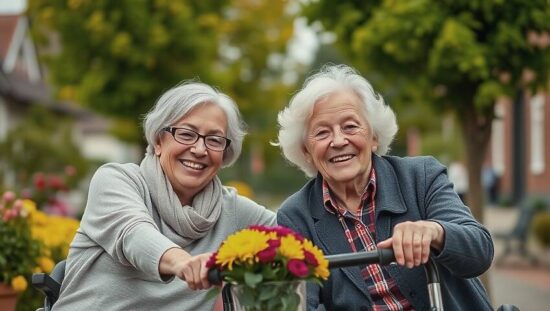Older people in Germany are becoming more diverse and active, but still face many barriers to participation, according to the 9th Report on the Situation of the Older Generation, presented by Federal Family Minister Lisa Paus (Greens) in Berlin on Wednesday.
Older people in Germany are as diverse as never before, bring themselves in and are active until old age. However, they still need to overcome many hurdles to participate in social life.
“All older people must have the same opportunities for participation, regardless of gender, origin, or social status” said Paus. “Many women, especially those with a migration background, are still disadvantaged.” The chair of the report commission, Martina Brandt, added that one must “appreciate the diversity of age, combat discrimination, and eliminate inequalities.” “To ensure and improve the self-determined and equal participation of all older people in times of challenges and crises, we must develop an integrated policy for a good life in old age together.”
The report also takes into account the experiences of older people with exclusion and discrimination: For example, life situations with strongly restricted participation can arise when older people live in poverty and precarious housing, are physically and/or mentally ill, or have experienced violence. Even in life situations where care dependence, social isolation, and loneliness coexist, participation chances can be restricted.
Another report point is age discrimination: The so-called “ageism” occurs when people are evaluated or treated due to their age, although the corresponding evaluation or treatment is not justified. Expressions of this are emotional evaluations of older people. An example of “ageism” is when it is assumed that older people do not hear well, do not understand quickly, and are therefore spoken to in interactions with them as if to a small child: loudly and slowly, and in very simple sentences (“Secondary Baby Talk”).
According to Paus, corresponding notifications at the Federal Anti-Discrimination Agency increased by 70 percent in 2023 compared to the previous year. “This alarming increase shows impressively how prejudices and discrimination against older people still exist in our society” said Paus. “This is not acceptable.”
The commission responsible for the report issued a total of 31 recommendations to politics and civil society. It recommends, among other things, securing the material situation in old age better, providing a “diversity-sensitive healthcare system” and countering age-based discrimination.
The first reactions to the report were mixed. The German Association of Social Welfare (SoVD) expressed concern: “These numbers are alarming – no one should be at the end of their working life in poverty” said SoVD Chairwoman Michaela Engelmeier to the Funke Media Group newspapers.
Many older people are coming to the SoVD’s counseling centers, who are “financially on the edge” Engelmeier said. And one is also receiving more worried letters from retirees, who are complaining that everything is getting more expensive and they do not know how they will manage to do so. At the same time, many beneficiaries are not even taking up the basic security in old age or the housing benefit. “Here, we have been demanding a free allowance in the basic security in old age and for disability benefits for a long time – and that without conditions” said Engelmeier.
The SPD’s senior policy spokesperson, Leni Breymaier, praises “many valuable hints and important recommendations” in the report. “Communities, states, and the federal government should, equally, break down existing barriers, overcome obstacles, and combat discrimination” she said. But this can only be implemented with the right compass, which must be primarily directed at the goal “a good life in old age for all” so Breymaier.





